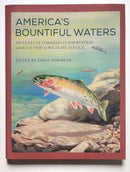Description
Hardcover, 278 Pages.
The U.S. Fish & Wildlife Service is the direct descendant of the U.S. Fish Commission, founded in 1871. In 2021, its Fish and Aquatic Conservation division marked its 150th anniversary, the oldest conservation agency in history. To commemorate this milestone, the USFWS published this compelling history to celebrate the broad-thinking scientists, writers, and artists who led us through the gilded age of American ichthyology into the present day. The book is natural and cultural history, biography and memoir, and loaded with compelling historic and fresh photos. The fishes are illustrated by Joe Tomelleri.
The 278-page coffee table book offers a valuable historical reference for how the predecessor to what is now known as the U.S. Fish and Wildlife Service (FWS) began in 1871. Edited by FWS fisheries biologist and writer, Craig Springer, the book includes full color and historical images and engaging storytelling of this important piece of conservation history.
Early pages of the book focus on the history of fisheries declines and the development of fish propagation techniques. The book starts with a conservation-minded Roosevelt, not the often-credited conservationist Theodore but rather his uncle Robert Barnwell Roosevelt, an avid angler who founded the New York State Fishery Commission in 1867 and served as fish commissioner from 1868-1888. While serving as a member of Congress, he envisioned a federal bureau comparable to the state entity and worked to pass legislation forming the U.S. Fish Commission in 1871, the agency that ultimately became the FWS. Throughout the book are stories of the many similar characters who all played important roles in understanding aquatic ecology, fish hatcheries, fish habitat restoration, and the recovery of declining freshwater fisheries. The stories of conservation and restoration of more than 50 different species, not just those familiar sportfish but also darters and salamanders and turtles that benefited from the improved aquatic environment, are told by the biologists who know them best.
Excerpt from Alligator Gar by Ralph Simmons
A marvel of the fish’s life history is also a confounding factor in their conservation… Popular opinion of alligator gar seems to be shifting. Anglers recognize its potential as a sport fish; the world-record fish checked in at 327 pounds and nearly nine feet long. Alligator gar is the second-largest freshwater fish in North America behind white sturgeon. The alligator gar is an apex predator and stands atop of the food chain in big rivers in the South and much of the Midwest. Unlike other fish, it waits in ambush for prey nearly one-third its own body length. It shoots forward with explosive speed to catch food in its toothy jaws. Alligator gar have an extra row of teeth in their upper jaws to hold larger prey until they can swallow them whole. Research in stomach content analysis revealed that alligator gar eat a wide variety of fish and small mammals, but carp, drum, and buffalo fish species dominate its diet—rough species of fish that can overpopulate rivers when left unchecked.
Excerpt from Lahontan Cutthroat Trout by Carlos R. Martinez
Lahontan cutthroat owe their size to their knack for preying on fish—cui-ui sucker, tui chub, and cannibalizing their own. All three fishes were culturally important and were a food source for the Northern Paiute people of the Great Basin. In 1844, while searching for the mythical Buenaventura River, John C. Fremont was the first English writer to document the Lahontan cutthroat. At the mouth of the Truckee River members of the Pyramid Lake Paiute Tribe provided his party with specimens measuring up to four feet long. This was not an embellishment, as early settlers documented fish exceeding sixty pounds. In 1916, the largest confirmed specimen tipped the scale at sixty-two pounds. Fremont compared the Lahontan to the Chinook salmon of the Columbia River and described their flavor as “superior to that of any fish I have known.”




























